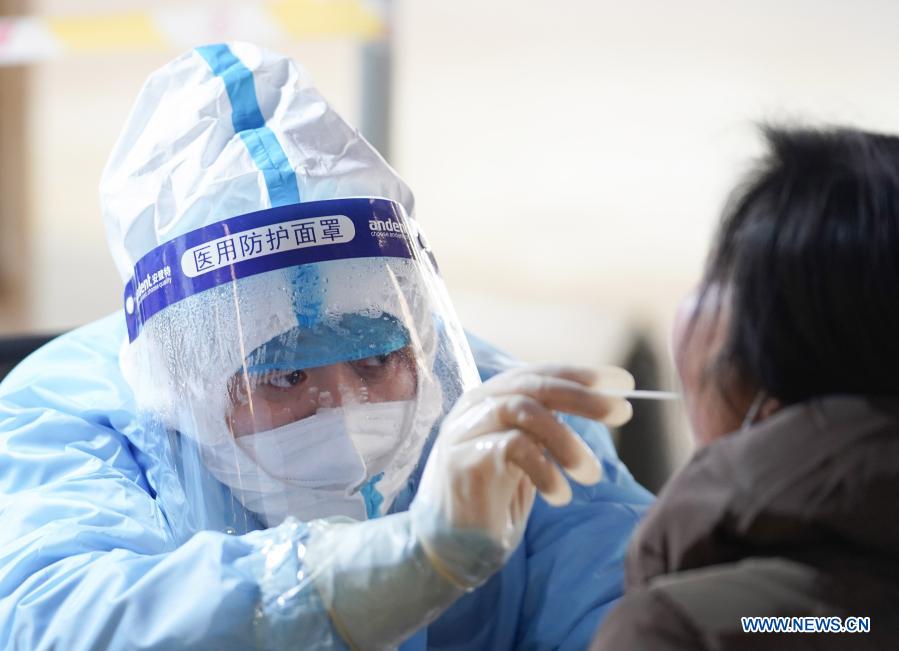Three Chinese cities resume mass testing to halt COVID-19
The Chinese cities of Shijiazhuang and Tonghua, as well as Daxing District of the national capital Beijing, started a new round of mass nucleic acid testing on Wednesday in an effort to contain the latest COVID-19 resurgence.
The Chinese cities of Shijiazhuang and Tonghua, as well as Daxing District of the national capital Beijing, started a new round of mass nucleic acid testing on Wednesday in an effort to contain the latest COVID-19 resurgence.

A medical worker collects a swab sample from a resident at a COVID-19 testing site in Daxing District of Beijing, capital of China, Jan. 20, 2021. (Xinhua/Ju Huanzong)
The mass testing was launched in the wake of a recent emergence of COVID-19 cases in these areas. On Tuesday, the city of Tonghua in the northeastern Jilin Province reported a total of 36 locally transmitted confirmed COVID-19 cases, while Shijiazhuang in north China's Hebei Province and Beijing's Daxing District recorded 13 and six cases, respectively.
The Chinese mainland reported a total of 88 locally transmitted confirmed COVID-19 cases on Tuesday -- 46 in Jilin, 19 in Hebei, 16 in the northeastern Heilongjiang Province and seven in Beijing. Authorities in the affected areas have been making all-out efforts to stem the spread of the virus.
A total of 3,470 medical workers from across China were dispatched recently to Shijiazhuang to assist in the city's fight against COVID-19. They have been working in fields including epidemiological investigation, nucleic acid sampling and testing, and the transportation and treatment of patients.
The city of Tonghua has suspended railway services, flights, long-distance buses and taxis, starting from 1 a.m. Wednesday, while private cars have been banned from entering or leaving the city.
Beijing's Daxing District issued a notification on Wednesday banning all people in the district from leaving the capital.
Those who need to travel outside the city should obtain approval from local authorities and obtain a negative COVID-19 nucleic acid test result taken within three days prior to the departure, according to the leading group on epidemic prevention and control work in Daxing.
The district will enforce stringent lockdown management in five residential compounds in the Tiangongyuan sub-district, where the new cases were detected.
Over 24,000 residents of the compounds are now required to self-quarantine in their homes.
Health authorities in Beijing said on Wednesday that they had identified the novel coronavirus behind the recent COVID-19 cases in Daxing as the mutant strain first found in Britain.
Pang Xinghuo, deputy director of the Beijing municipal center for disease control and prevention, said the Chinese Center for Disease Control and Prevention has reviewed the findings and concluded it was the same mutant strain spreading in Britain.
It is now believed that the strain arrived from overseas, Pang added.
In Heilongjiang Province, all 16 confirmed cases reported on Tuesday have been sent to designated medical institutions. Their close contacts and secondary close contacts have been put under medical isolation, and the places they visited have been disinfected.
More than 2,500 nursing homes across the province have been put under closed-off management to contain the COVID-19 resurgence.
Wangkui County in the city of Suihua has been classified as a high-risk area for COVID-19 since 7 a.m. Wednesday.
China's National Health Commission said on Wednesday that more than 15 million doses of COVID-19 vaccine have been administered in China since the country launched its vaccination program in December last year.
After vaccinating key population groups, including medical personnel, transportation workers and workers at border ports, China will progress mass vaccination at a steady pace, according to Wang Bin, an official with the commission.

